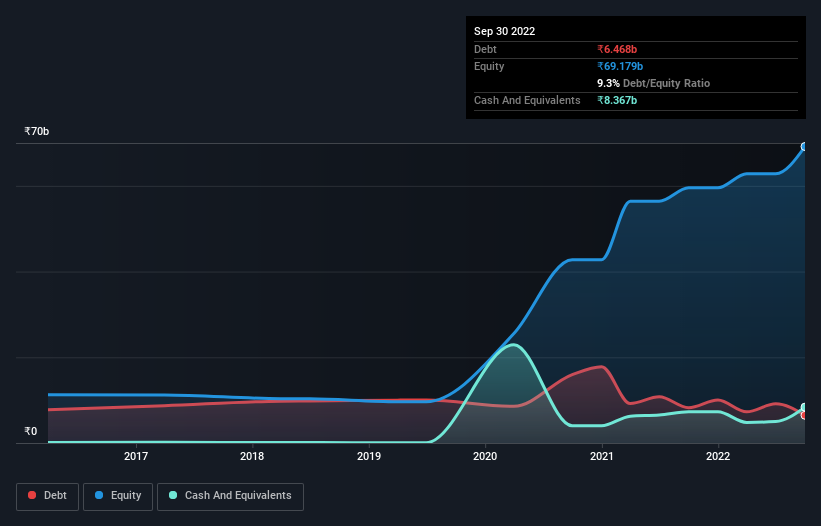- India
- /
- Healthcare Services
- /
- NSEI:MAXHEALTH
Max Healthcare Institute (NSE:MAXHEALTH) Has A Rock Solid Balance Sheet

The external fund manager backed by Berkshire Hathaway's Charlie Munger, Li Lu, makes no bones about it when he says 'The biggest investment risk is not the volatility of prices, but whether you will suffer a permanent loss of capital.' So it might be obvious that you need to consider debt, when you think about how risky any given stock is, because too much debt can sink a company. As with many other companies Max Healthcare Institute Limited (NSE:MAXHEALTH) makes use of debt. But should shareholders be worried about its use of debt?
When Is Debt A Problem?
Debt and other liabilities become risky for a business when it cannot easily fulfill those obligations, either with free cash flow or by raising capital at an attractive price. If things get really bad, the lenders can take control of the business. However, a more frequent (but still costly) occurrence is where a company must issue shares at bargain-basement prices, permanently diluting shareholders, just to shore up its balance sheet. Having said that, the most common situation is where a company manages its debt reasonably well - and to its own advantage. The first step when considering a company's debt levels is to consider its cash and debt together.
Our analysis indicates that MAXHEALTH is potentially overvalued!
What Is Max Healthcare Institute's Debt?
The image below, which you can click on for greater detail, shows that Max Healthcare Institute had debt of ₹6.47b at the end of September 2022, a reduction from ₹8.23b over a year. But it also has ₹8.37b in cash to offset that, meaning it has ₹1.90b net cash.

How Healthy Is Max Healthcare Institute's Balance Sheet?
Zooming in on the latest balance sheet data, we can see that Max Healthcare Institute had liabilities of ₹8.11b due within 12 months and liabilities of ₹17.8b due beyond that. Offsetting this, it had ₹8.37b in cash and ₹3.79b in receivables that were due within 12 months. So its liabilities total ₹13.7b more than the combination of its cash and short-term receivables.
Of course, Max Healthcare Institute has a market capitalization of ₹419.9b, so these liabilities are probably manageable. But there are sufficient liabilities that we would certainly recommend shareholders continue to monitor the balance sheet, going forward. While it does have liabilities worth noting, Max Healthcare Institute also has more cash than debt, so we're pretty confident it can manage its debt safely.
On top of that, Max Healthcare Institute grew its EBIT by 33% over the last twelve months, and that growth will make it easier to handle its debt. When analysing debt levels, the balance sheet is the obvious place to start. But ultimately the future profitability of the business will decide if Max Healthcare Institute can strengthen its balance sheet over time. So if you want to see what the professionals think, you might find this free report on analyst profit forecasts to be interesting.
But our final consideration is also important, because a company cannot pay debt with paper profits; it needs cold hard cash. While Max Healthcare Institute has net cash on its balance sheet, it's still worth taking a look at its ability to convert earnings before interest and tax (EBIT) to free cash flow, to help us understand how quickly it is building (or eroding) that cash balance. Over the most recent three years, Max Healthcare Institute recorded free cash flow worth 52% of its EBIT, which is around normal, given free cash flow excludes interest and tax. This cold hard cash means it can reduce its debt when it wants to.
Summing Up
We could understand if investors are concerned about Max Healthcare Institute's liabilities, but we can be reassured by the fact it has has net cash of ₹1.90b. And it impressed us with its EBIT growth of 33% over the last year. So we don't think Max Healthcare Institute's use of debt is risky. Another factor that would give us confidence in Max Healthcare Institute would be if insiders have been buying shares: if you're conscious of that signal too, you can find out instantly by clicking this link.
Of course, if you're the type of investor who prefers buying stocks without the burden of debt, then don't hesitate to discover our exclusive list of net cash growth stocks, today.
New: Manage All Your Stock Portfolios in One Place
We've created the ultimate portfolio companion for stock investors, and it's free.
• Connect an unlimited number of Portfolios and see your total in one currency
• Be alerted to new Warning Signs or Risks via email or mobile
• Track the Fair Value of your stocks
Have feedback on this article? Concerned about the content? Get in touch with us directly. Alternatively, email editorial-team (at) simplywallst.com.
This article by Simply Wall St is general in nature. We provide commentary based on historical data and analyst forecasts only using an unbiased methodology and our articles are not intended to be financial advice. It does not constitute a recommendation to buy or sell any stock, and does not take account of your objectives, or your financial situation. We aim to bring you long-term focused analysis driven by fundamental data. Note that our analysis may not factor in the latest price-sensitive company announcements or qualitative material. Simply Wall St has no position in any stocks mentioned.
About NSEI:MAXHEALTH
Max Healthcare Institute
Provides medical and healthcare services in India.
High growth potential with excellent balance sheet.


